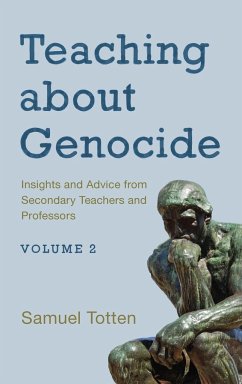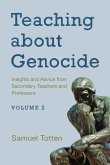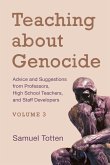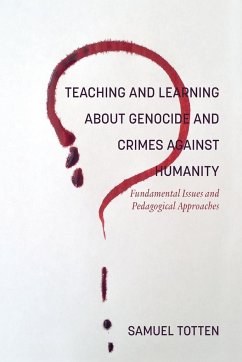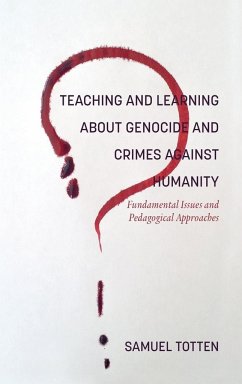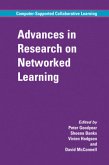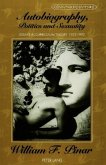Teaching about Genocide
Insights and Advice from Secondary Teachers and Professors
Herausgeber: Totten, Samuel
Teaching about Genocide
Insights and Advice from Secondary Teachers and Professors
Herausgeber: Totten, Samuel
- Gebundenes Buch
- Merkliste
- Auf die Merkliste
- Bewerten Bewerten
- Teilen
- Produkt teilen
- Produkterinnerung
- Produkterinnerung
Secondary level teachers and professors from various disciplines present their best advice and insights into teaching about various facets of genocide.
Andere Kunden interessierten sich auch für
![Teaching about Genocide Teaching about Genocide]() Teaching about Genocide42,99 €
Teaching about Genocide42,99 €![Teaching about Genocide Teaching about Genocide]() Teaching about Genocide47,99 €
Teaching about Genocide47,99 €![Teaching and Learning About Genocide and Crimes Against Humanity Teaching and Learning About Genocide and Crimes Against Humanity]() Samuel TottenTeaching and Learning About Genocide and Crimes Against Humanity61,99 €
Samuel TottenTeaching and Learning About Genocide and Crimes Against Humanity61,99 €![Teaching and Learning About Genocide and Crimes Against Humanity Teaching and Learning About Genocide and Crimes Against Humanity]() Samuel TottenTeaching and Learning About Genocide and Crimes Against Humanity109,99 €
Samuel TottenTeaching and Learning About Genocide and Crimes Against Humanity109,99 €![Advances in Research on Networked Learning Advances in Research on Networked Learning]() Peter Goodyear / Sheena Banks / Vivien Hodgson / David McConnell (eds.)Advances in Research on Networked Learning77,99 €
Peter Goodyear / Sheena Banks / Vivien Hodgson / David McConnell (eds.)Advances in Research on Networked Learning77,99 €![Complexity and Simplicity Complexity and Simplicity]() Complexity and Simplicity78,99 €
Complexity and Simplicity78,99 €![Autobiography, Politics and Sexuality Autobiography, Politics and Sexuality]() William F. PinarAutobiography, Politics and Sexuality31,35 €
William F. PinarAutobiography, Politics and Sexuality31,35 €-
-
-
Secondary level teachers and professors from various disciplines present their best advice and insights into teaching about various facets of genocide.
Produktdetails
- Produktdetails
- Verlag: Rowman & Littlefield Publishers
- Seitenzahl: 242
- Erscheinungstermin: 14. Dezember 2018
- Englisch
- Abmessung: 235mm x 157mm x 19mm
- Gewicht: 549g
- ISBN-13: 9781475847420
- ISBN-10: 1475847424
- Artikelnr.: 53688045
- Herstellerkennzeichnung
- Libri GmbH
- Europaallee 1
- 36244 Bad Hersfeld
- gpsr@libri.de
- Verlag: Rowman & Littlefield Publishers
- Seitenzahl: 242
- Erscheinungstermin: 14. Dezember 2018
- Englisch
- Abmessung: 235mm x 157mm x 19mm
- Gewicht: 549g
- ISBN-13: 9781475847420
- ISBN-10: 1475847424
- Artikelnr.: 53688045
- Herstellerkennzeichnung
- Libri GmbH
- Europaallee 1
- 36244 Bad Hersfeld
- gpsr@libri.de
Samuel Totten a longtime scholar of genocide studies and retired professor (University of Arkansas, Fayetteville), is the author of Teaching About Crimes Against Humanity and Genocide: Fundamental Issues and Approaches (Information Age Publishing, 2018). Over the past fourteen years he has conducted field work into crimes against humanity and genocide in the refugee camps along the Chad/Darfur, Sudan border, and in the Nuba Mountains of Sudan.
Introduction - Samuel Totten
Part One: Insights and Advice from Secondary Level Teachers
1. "Student as Worker in Coming to Understand Modern Genocide: From KWL to
Stanton's Ten Stages to Case Studies to Engaging in a Debate" by Keith
Eaton (English Teacher, Mount Desert Island High School, Bar Harbor, Maine)
2. "Challenging or Passively Accepting Questionable Authority" by Jamie
Allen (History Teacher, Centennial Regional High School, Greenfield Park,
Quebec, Canada)
3. "The Power of Story: Teaching About Genocide Through Literature Circles"
by Kelley Szany (Director of Education, Illinois Holocaust Museum &
Education Center, Skokie, Illinois)
4. "Reader as Witness: Introducing Students to Genocide Through Literature"
by
Dr. Sarah J. Donovan (English Language Arts Teacher, Plum Grove Junior
High, Rolling Meadows, Illinois, and Adjunct Instructor at DePaul
University and Dominican University).
5. "Unsettling Narratives: Teaching About the Genocide of Indigenous
Peoples in North America" by George Dalbo (Social Studies Teacher, Mounds
Park Academy, St. Paul, Minnesota; and Ph.D Candidate, University of
Minnesota)
6. "Teaching the Armenian Genocide in a Nation Whose Government Refuses to
Acknowledge It" by Dr. Mark Gudgel (English and Honor Humanities Teacher,
Omaha North High School, Omaha, Nebraska, and Adjunct Instructor, Southeast
Community College, English Department)
7. "Flora's Journey: Teaching the Cultural Events and Significance of the
Armenian Genocide" by Brent Beerman (English and Theater Teacher, Crescenta
Valley High School, La Crescenta, California)
8. "Using Rebecca Tinsley's When the Stars Fall to Earth in the Classroom
to Teach About the Darfur Genocide" by Kimberly Klett (English Teacher,
Dobson High School, Mesa, Arizona)
9. "Simplicity and Complexity" by Dr. Mary Lee Webeck (Director of
Education, Holocaust Museum Houston, Houston, Texas)
Part Two: Insights and Advice from Professors
10. "At the Threshold of Genocide Studies: On Not Being a Gatekeeper" by
Dr. Andrew Woolford (Professor, Department of Sociology, University of
Manitoba)
11. "Teaching Ten Stages of Genocide" by Dr. Gregory H. Stanton (Research
Professor in Genocide Studies and Prevention, School for Conflict Analysis
and Resolution
George Mason University, Fairfax, Virginia)
12. "The Three "Ds" of Teaching History: A Focus on Genocide" by Dr.
Khatchig Mouradian (Visiting Assistant Professor, Departments of History
and Sociology, Rutgers University, Newark, New Jersey)
13. "Teaching About Genocide: Three Major Pedagogical Issues Worthy of
Serious Consideration by Teachers" by Dr. Rubina Peroomian (Research
Associate, Department of Near Eastern. Languages and Cultures. University
of California, Los Angeles)
14. "Incorporating the Issue of Genocide into History Courses:
Enlightenment and Mobilization" by Dr. John Hubbel Weiss (Associate
Professor of History, Cornell University, Ithaca, New York)
15. "Towards a Critical Pedagogy for Genocide Education" by Dr. James G.
Brown (Professor of Teaching, Joint Appointment in the Department of Peace
Studies and College of Educational Studies, Chapman University, Orange,
California)
16. "Teaching About the Bosnian Genocide" by Dr. Fred P. Cocozzelli
(Associate Professor, Department of Government and Politics, St. John's
University, Queens, New York)
17. Adam Muller by (Professor and Director of Peace and Conflict Studies,
University of Manitoba, Winnipeg, Canada)
18. "A Focus on the Prevention of Genocide" by Dr. Agnieszka
Bienczyk-Missala (Assistant Professor, Institute of International
Relations, University of Warsaw, Poland)
19. "Educating the Military.and Others. Building the Basis for Effective
Atrocity Prevention" by Dr. David Frey (Associate Professor of History and
Director, Center for Holocaust and Genocide Studies, United States Military
Academy at West Point)
20. "Teaching Complexity via Documentaries: Trauma and Co-existence after
Genocide in Rwanda" by Dr. Gerise Herndon (Professor of English and Global
Studies, Nebraska Wesleyan University, Lincoln, Nebraska)
21. "Acts of Loving Kindness: Genocide Education in Cambodia" by Dr.
Theresa de Langis (Associate Professor of Global Affairs, and Director,
Center for Southeast Asian Studies, American University of Phnom Penh,
Cambodia)
Part One: Insights and Advice from Secondary Level Teachers
1. "Student as Worker in Coming to Understand Modern Genocide: From KWL to
Stanton's Ten Stages to Case Studies to Engaging in a Debate" by Keith
Eaton (English Teacher, Mount Desert Island High School, Bar Harbor, Maine)
2. "Challenging or Passively Accepting Questionable Authority" by Jamie
Allen (History Teacher, Centennial Regional High School, Greenfield Park,
Quebec, Canada)
3. "The Power of Story: Teaching About Genocide Through Literature Circles"
by Kelley Szany (Director of Education, Illinois Holocaust Museum &
Education Center, Skokie, Illinois)
4. "Reader as Witness: Introducing Students to Genocide Through Literature"
by
Dr. Sarah J. Donovan (English Language Arts Teacher, Plum Grove Junior
High, Rolling Meadows, Illinois, and Adjunct Instructor at DePaul
University and Dominican University).
5. "Unsettling Narratives: Teaching About the Genocide of Indigenous
Peoples in North America" by George Dalbo (Social Studies Teacher, Mounds
Park Academy, St. Paul, Minnesota; and Ph.D Candidate, University of
Minnesota)
6. "Teaching the Armenian Genocide in a Nation Whose Government Refuses to
Acknowledge It" by Dr. Mark Gudgel (English and Honor Humanities Teacher,
Omaha North High School, Omaha, Nebraska, and Adjunct Instructor, Southeast
Community College, English Department)
7. "Flora's Journey: Teaching the Cultural Events and Significance of the
Armenian Genocide" by Brent Beerman (English and Theater Teacher, Crescenta
Valley High School, La Crescenta, California)
8. "Using Rebecca Tinsley's When the Stars Fall to Earth in the Classroom
to Teach About the Darfur Genocide" by Kimberly Klett (English Teacher,
Dobson High School, Mesa, Arizona)
9. "Simplicity and Complexity" by Dr. Mary Lee Webeck (Director of
Education, Holocaust Museum Houston, Houston, Texas)
Part Two: Insights and Advice from Professors
10. "At the Threshold of Genocide Studies: On Not Being a Gatekeeper" by
Dr. Andrew Woolford (Professor, Department of Sociology, University of
Manitoba)
11. "Teaching Ten Stages of Genocide" by Dr. Gregory H. Stanton (Research
Professor in Genocide Studies and Prevention, School for Conflict Analysis
and Resolution
George Mason University, Fairfax, Virginia)
12. "The Three "Ds" of Teaching History: A Focus on Genocide" by Dr.
Khatchig Mouradian (Visiting Assistant Professor, Departments of History
and Sociology, Rutgers University, Newark, New Jersey)
13. "Teaching About Genocide: Three Major Pedagogical Issues Worthy of
Serious Consideration by Teachers" by Dr. Rubina Peroomian (Research
Associate, Department of Near Eastern. Languages and Cultures. University
of California, Los Angeles)
14. "Incorporating the Issue of Genocide into History Courses:
Enlightenment and Mobilization" by Dr. John Hubbel Weiss (Associate
Professor of History, Cornell University, Ithaca, New York)
15. "Towards a Critical Pedagogy for Genocide Education" by Dr. James G.
Brown (Professor of Teaching, Joint Appointment in the Department of Peace
Studies and College of Educational Studies, Chapman University, Orange,
California)
16. "Teaching About the Bosnian Genocide" by Dr. Fred P. Cocozzelli
(Associate Professor, Department of Government and Politics, St. John's
University, Queens, New York)
17. Adam Muller by (Professor and Director of Peace and Conflict Studies,
University of Manitoba, Winnipeg, Canada)
18. "A Focus on the Prevention of Genocide" by Dr. Agnieszka
Bienczyk-Missala (Assistant Professor, Institute of International
Relations, University of Warsaw, Poland)
19. "Educating the Military.and Others. Building the Basis for Effective
Atrocity Prevention" by Dr. David Frey (Associate Professor of History and
Director, Center for Holocaust and Genocide Studies, United States Military
Academy at West Point)
20. "Teaching Complexity via Documentaries: Trauma and Co-existence after
Genocide in Rwanda" by Dr. Gerise Herndon (Professor of English and Global
Studies, Nebraska Wesleyan University, Lincoln, Nebraska)
21. "Acts of Loving Kindness: Genocide Education in Cambodia" by Dr.
Theresa de Langis (Associate Professor of Global Affairs, and Director,
Center for Southeast Asian Studies, American University of Phnom Penh,
Cambodia)
Introduction - Samuel Totten
Part One: Insights and Advice from Secondary Level Teachers
1. "Student as Worker in Coming to Understand Modern Genocide: From KWL to
Stanton's Ten Stages to Case Studies to Engaging in a Debate" by Keith
Eaton (English Teacher, Mount Desert Island High School, Bar Harbor, Maine)
2. "Challenging or Passively Accepting Questionable Authority" by Jamie
Allen (History Teacher, Centennial Regional High School, Greenfield Park,
Quebec, Canada)
3. "The Power of Story: Teaching About Genocide Through Literature Circles"
by Kelley Szany (Director of Education, Illinois Holocaust Museum &
Education Center, Skokie, Illinois)
4. "Reader as Witness: Introducing Students to Genocide Through Literature"
by
Dr. Sarah J. Donovan (English Language Arts Teacher, Plum Grove Junior
High, Rolling Meadows, Illinois, and Adjunct Instructor at DePaul
University and Dominican University).
5. "Unsettling Narratives: Teaching About the Genocide of Indigenous
Peoples in North America" by George Dalbo (Social Studies Teacher, Mounds
Park Academy, St. Paul, Minnesota; and Ph.D Candidate, University of
Minnesota)
6. "Teaching the Armenian Genocide in a Nation Whose Government Refuses to
Acknowledge It" by Dr. Mark Gudgel (English and Honor Humanities Teacher,
Omaha North High School, Omaha, Nebraska, and Adjunct Instructor, Southeast
Community College, English Department)
7. "Flora's Journey: Teaching the Cultural Events and Significance of the
Armenian Genocide" by Brent Beerman (English and Theater Teacher, Crescenta
Valley High School, La Crescenta, California)
8. "Using Rebecca Tinsley's When the Stars Fall to Earth in the Classroom
to Teach About the Darfur Genocide" by Kimberly Klett (English Teacher,
Dobson High School, Mesa, Arizona)
9. "Simplicity and Complexity" by Dr. Mary Lee Webeck (Director of
Education, Holocaust Museum Houston, Houston, Texas)
Part Two: Insights and Advice from Professors
10. "At the Threshold of Genocide Studies: On Not Being a Gatekeeper" by
Dr. Andrew Woolford (Professor, Department of Sociology, University of
Manitoba)
11. "Teaching Ten Stages of Genocide" by Dr. Gregory H. Stanton (Research
Professor in Genocide Studies and Prevention, School for Conflict Analysis
and Resolution
George Mason University, Fairfax, Virginia)
12. "The Three "Ds" of Teaching History: A Focus on Genocide" by Dr.
Khatchig Mouradian (Visiting Assistant Professor, Departments of History
and Sociology, Rutgers University, Newark, New Jersey)
13. "Teaching About Genocide: Three Major Pedagogical Issues Worthy of
Serious Consideration by Teachers" by Dr. Rubina Peroomian (Research
Associate, Department of Near Eastern. Languages and Cultures. University
of California, Los Angeles)
14. "Incorporating the Issue of Genocide into History Courses:
Enlightenment and Mobilization" by Dr. John Hubbel Weiss (Associate
Professor of History, Cornell University, Ithaca, New York)
15. "Towards a Critical Pedagogy for Genocide Education" by Dr. James G.
Brown (Professor of Teaching, Joint Appointment in the Department of Peace
Studies and College of Educational Studies, Chapman University, Orange,
California)
16. "Teaching About the Bosnian Genocide" by Dr. Fred P. Cocozzelli
(Associate Professor, Department of Government and Politics, St. John's
University, Queens, New York)
17. Adam Muller by (Professor and Director of Peace and Conflict Studies,
University of Manitoba, Winnipeg, Canada)
18. "A Focus on the Prevention of Genocide" by Dr. Agnieszka
Bienczyk-Missala (Assistant Professor, Institute of International
Relations, University of Warsaw, Poland)
19. "Educating the Military.and Others. Building the Basis for Effective
Atrocity Prevention" by Dr. David Frey (Associate Professor of History and
Director, Center for Holocaust and Genocide Studies, United States Military
Academy at West Point)
20. "Teaching Complexity via Documentaries: Trauma and Co-existence after
Genocide in Rwanda" by Dr. Gerise Herndon (Professor of English and Global
Studies, Nebraska Wesleyan University, Lincoln, Nebraska)
21. "Acts of Loving Kindness: Genocide Education in Cambodia" by Dr.
Theresa de Langis (Associate Professor of Global Affairs, and Director,
Center for Southeast Asian Studies, American University of Phnom Penh,
Cambodia)
Part One: Insights and Advice from Secondary Level Teachers
1. "Student as Worker in Coming to Understand Modern Genocide: From KWL to
Stanton's Ten Stages to Case Studies to Engaging in a Debate" by Keith
Eaton (English Teacher, Mount Desert Island High School, Bar Harbor, Maine)
2. "Challenging or Passively Accepting Questionable Authority" by Jamie
Allen (History Teacher, Centennial Regional High School, Greenfield Park,
Quebec, Canada)
3. "The Power of Story: Teaching About Genocide Through Literature Circles"
by Kelley Szany (Director of Education, Illinois Holocaust Museum &
Education Center, Skokie, Illinois)
4. "Reader as Witness: Introducing Students to Genocide Through Literature"
by
Dr. Sarah J. Donovan (English Language Arts Teacher, Plum Grove Junior
High, Rolling Meadows, Illinois, and Adjunct Instructor at DePaul
University and Dominican University).
5. "Unsettling Narratives: Teaching About the Genocide of Indigenous
Peoples in North America" by George Dalbo (Social Studies Teacher, Mounds
Park Academy, St. Paul, Minnesota; and Ph.D Candidate, University of
Minnesota)
6. "Teaching the Armenian Genocide in a Nation Whose Government Refuses to
Acknowledge It" by Dr. Mark Gudgel (English and Honor Humanities Teacher,
Omaha North High School, Omaha, Nebraska, and Adjunct Instructor, Southeast
Community College, English Department)
7. "Flora's Journey: Teaching the Cultural Events and Significance of the
Armenian Genocide" by Brent Beerman (English and Theater Teacher, Crescenta
Valley High School, La Crescenta, California)
8. "Using Rebecca Tinsley's When the Stars Fall to Earth in the Classroom
to Teach About the Darfur Genocide" by Kimberly Klett (English Teacher,
Dobson High School, Mesa, Arizona)
9. "Simplicity and Complexity" by Dr. Mary Lee Webeck (Director of
Education, Holocaust Museum Houston, Houston, Texas)
Part Two: Insights and Advice from Professors
10. "At the Threshold of Genocide Studies: On Not Being a Gatekeeper" by
Dr. Andrew Woolford (Professor, Department of Sociology, University of
Manitoba)
11. "Teaching Ten Stages of Genocide" by Dr. Gregory H. Stanton (Research
Professor in Genocide Studies and Prevention, School for Conflict Analysis
and Resolution
George Mason University, Fairfax, Virginia)
12. "The Three "Ds" of Teaching History: A Focus on Genocide" by Dr.
Khatchig Mouradian (Visiting Assistant Professor, Departments of History
and Sociology, Rutgers University, Newark, New Jersey)
13. "Teaching About Genocide: Three Major Pedagogical Issues Worthy of
Serious Consideration by Teachers" by Dr. Rubina Peroomian (Research
Associate, Department of Near Eastern. Languages and Cultures. University
of California, Los Angeles)
14. "Incorporating the Issue of Genocide into History Courses:
Enlightenment and Mobilization" by Dr. John Hubbel Weiss (Associate
Professor of History, Cornell University, Ithaca, New York)
15. "Towards a Critical Pedagogy for Genocide Education" by Dr. James G.
Brown (Professor of Teaching, Joint Appointment in the Department of Peace
Studies and College of Educational Studies, Chapman University, Orange,
California)
16. "Teaching About the Bosnian Genocide" by Dr. Fred P. Cocozzelli
(Associate Professor, Department of Government and Politics, St. John's
University, Queens, New York)
17. Adam Muller by (Professor and Director of Peace and Conflict Studies,
University of Manitoba, Winnipeg, Canada)
18. "A Focus on the Prevention of Genocide" by Dr. Agnieszka
Bienczyk-Missala (Assistant Professor, Institute of International
Relations, University of Warsaw, Poland)
19. "Educating the Military.and Others. Building the Basis for Effective
Atrocity Prevention" by Dr. David Frey (Associate Professor of History and
Director, Center for Holocaust and Genocide Studies, United States Military
Academy at West Point)
20. "Teaching Complexity via Documentaries: Trauma and Co-existence after
Genocide in Rwanda" by Dr. Gerise Herndon (Professor of English and Global
Studies, Nebraska Wesleyan University, Lincoln, Nebraska)
21. "Acts of Loving Kindness: Genocide Education in Cambodia" by Dr.
Theresa de Langis (Associate Professor of Global Affairs, and Director,
Center for Southeast Asian Studies, American University of Phnom Penh,
Cambodia)

